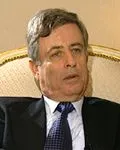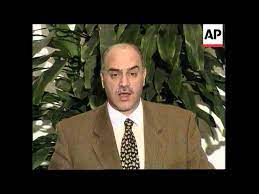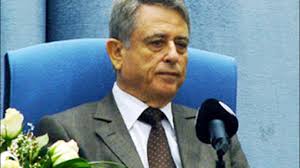Syrian Vice President Abdel Halim Khaddam described Bahraini-Syrian relations as an excellent fraternal relationship that is becoming deeper and stronger.
The leaders of both countries are keen to continue these relations in order to serve the interests of the two brotherly countries and the causes of the Arab nation.
During an official visit to the Syrian Arab Republic, Khaddam discussed with a Bahraini media delegation, led by Information Minister Tariq Abdulrahman Al-Moayyad, the necessity of intensifying mutual visits between Arab countries.
This would allow them to exchange experiences, coordinate and consult jointly, as well as to examine the achievements of Arab countries. Regarding the current tensions in the region, Khaddam stated that they were expected due to the poor international and Arab situation.
He added that Israel benefits from this situation, seeking to gain a political advantage in the upcoming Israeli elections. When asked if Israel intends to undertake acts of war against Syria, Khaddam replied that Syria would face such aggression with all its capabilities, but that significant losses would occur on both sides. Persistent tensions would not bring security to either party. However, he added that “we do not expect a military explosion, but when it happens, it is difficult to control the timing of the war.”
Regarding the Damascus Declaration, Abdel Halim Khaddam stated that the declaration serves as a guideline to correct the course of joint Arab action. He emphasized that the current Arab situation must not remain as it is because division and rupture are not in the Arabs’ interest. He added that the eight countries of the Damascus Declaration are qualified to revive the Arab situation from its current state due to the circumstances they have experienced.
He stated that Syria would oppose any aggression against the Gulf states because we believe that all Arab countries should take the initiative to support any Arab country that is threatened or attacked.
Details on page 5 show that Syrian Vice President Abdel Halim Khaddam considers the relations with Bahrain to be deepening and strengthening. He also believes that the current Arab situation is tempting for aspirants and that the Damascus Declaration is a guideline to correct the course of joint Arab action.
Nabil Al-Hamar wrote an article describing Khaddam as precise, enthusiastic, quick, a tough negotiator, and difficult to change his viewpoint. Western journalists also described him as a perceptive man passionate about the causes he believes in and defends, comparing him to a seasoned lawyer.
The office of Syrian Vice President Abdel Halim Khaddam is located in the center of the Al-Subki district in Damascus, in a two-story villa on the main street. During a visit by a media delegation led by Information Minister Tariq Abdulrahman Al-Moayyad, Khaddam welcomed the visitors and expressed his wish for them to stay longer in Damascus.
He also inquired about the Emir, the Prime Minister, and the Crown Prince of Bahrain and asked the minister to convey his greetings and affection to them. Khaddam discussed Syria’s relations with Bahrain and ways to strengthen them for the benefit of the two brotherly peoples.
He described the relations between the two countries as excellent fraternal relations that are strengthening and deepening. The leaders of both countries are determined to continue these relations to serve the interests of their respective nations and the Arab cause. He emphasized the need to increase mutual visits between Arab countries to exchange experiences, coordinate and consult jointly, and learn about achievements in the region. Khaddam acknowledged the current tensions in the region due to the unfavorable international and Arab situation. He noted that Israel is taking advantage of this situation and is looking to gain from the upcoming Israeli elections.
Khaddam called for active Arab action to counter the disintegrating Arab situation, which he sees as tempting for aspirants. He argued that Israel is trying to find an imaginary enemy for the West, especially after the collapse of the Soviet Union, and is now seeking to benefit from the current situation. Khaddam stated that Syria is now on the path to peace and is serious about it. In response to a question about a possible Israeli attack on Syria, he said that Syria would face any aggression with all its capabilities. However, he warned that both sides would suffer significant losses and that continued tensions would not guarantee the security of either party. He added that he does not expect a military explosion, but if it happens, it will be difficult to control the cessation of the war. Khaddam argued that Israel’s main objective in the current escalation is electoral, to keep Israelis in a state of tension that gives Israeli extremists a chance to win the elections. He concluded by stating that Israel does not want peace and that its lies were revealed when it was brought to the negotiating table, realizing that global public opinion would pressure it.
Abdel Halim Khaddam stated that the Damascus Declaration is a guideline to correct the course of joint Arab action and that the current Arab situation should not be left as it is. Division and rupture do not serve the interests of Arab countries.
He further mentioned that the eight countries of the Damascus Declaration, due to the circumstances they have experienced, are qualified to revive Arab action from its current state. Syria will oppose any aggression against the Gulf states, and any threat or attack against an Arab country must be countered by collective support.
Khaddam considers the Damascus Declaration as a necessity for the Gulf and Arab countries that meets the interests of both the state and the Arab nation, as it is open to all. He emphasized the crucial and precarious role of the media in the current phase that the Arab nation is going through. He believed that the media can play an important role in strengthening Arab relations and supporting solidarity between Arab countries. He explained that the media is one of the channels that can connect Arab peoples and strengthen their ties, as they are the closest channel to citizens. He also described the media as an army of warriors, and if the battle is won, the country is victorious. Therefore, the role of national media is very important, and media cooperation must be expanded in all areas.




